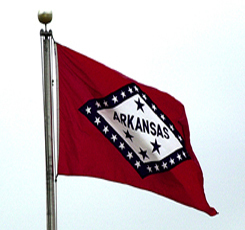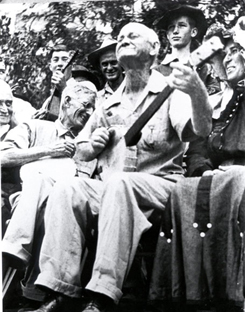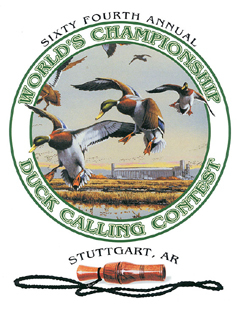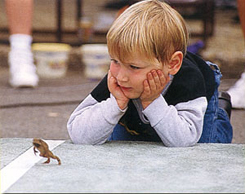
- Capital City:
- Little Rock
- Nickname:
- The Natural State / Land of Opportunity / Wonder State
- Motto:
- Regnat Populus (The people rule)
- Statehood:
- June 15, 1836 (25th)
- Origin of State's Name:
- French interpretation of a Sioux word "acansa," meaning "downstream place."
- Largest Cities:
- Little Rock, Fort Smith, North Little Rock, Pine Bluff, Jonesboro
- Border States:
- Louisiana, Mississippi, Missouri, Oklahoma, Tennessee, Texas
- Land Area:
- 52,075 sq. mi.; 27th largest
- State Bird:
- Mockingbird
- State Flower:
- Apple blossom
- State Tree:
- Pine (pinus)
- State Songs:
- Arkansas / Oh, Arkansas
Nicknamed the "Land of Opportunity," Arkansas, which joined the Union in 1836, was the 25th state. The early French explorers of the state gave it its name, which is probably a phonetic spelling for the French word for "downriver" people, a reference to the Quapaw Indians and the river along which they settled. Arkansas is the only state in which diamonds have been mined, although today the mine operates only as a tourist attraction. The state flower is the apple blossom.
The Ozark Mountains

The Ozark Mountains of Arkansas are the largest mountain range between the Appalachian Mountains in the East and the Rocky Mountains in the West.
The Ozark Mountains of Arkansas may have been named for Aux Arc, a French trading post located there in the 1700s. In French, Aux Arc means "at the bow." The limestone that is found there wears away easily and is responsible for many unusual geographic features, such as caves, sinkholes and underground streams. The Ozarks region is also known for its folk crafts and outdoor recreation.
The Ozark Mountains used to be an isolated place to live. Situated in northern Arkansas and parts of Illinois, Missouri, and Kansas, the Ozarks were covered by forests. The first people to live there were the Indians who were nicknamed "bluff dwellers" because they lived in the shelter of the mountains. The settlers who arrived in the 1800s were self-supporting, which means they grew their own food, hunted and raised free-range animals. Because it was isolated, a unique culture developed.
The Arkansas Folk Festival is an annual celebration of traditional Ozark culture, held the third weekend in April in Mountain View, Arkansas. Highlights are a parade, folk music concerts and workshops, a blacksmith shop, and demonstrations of such crafts as making soap, brooms, candles, pottery, dolls and toys.
The Ozark region is characterized by many underground streams and springs. Tourism is one of the region's chief industries and was given a boost by Harold Bell Wright's novel The Shepherd of the Hills (1907), which romanticized the Ozarks
World Championship Duck Calling Contest

Most people think about turkey for Thanksgiving, but in Stuttgart, Arkansas, the World Championship Duck Calling Contest takes place Thanksgiving week. More than 60,000 people attend the festival, which is the oldest in the state. The first duck-calling contest, held in 1936, had 17 contestants, with the first prize of a hunting coat valued at $6.60. Today the contest is held in six divisions, including junior, intermediate, and women, and the prize package is worth more than $15,000.
There are four basic types of duck calls. The "hail call" is a series of loud, pleading quacks that attract a flock's attention. Once you see ducks react to the hail, either by turning or slowing down, stop hailing them. As the ducks get closer, switch to a "greeting call," a series of five excited quacks. Then you use the "feed call" when they get close. Done properly, it mimics a group of contented ducks on the water. If the ducks are leaving, try the "come-back call." It's similar to the greeting call, but with louder, longer, pleading quacks. If your come-back call makes the ducks turn around, go back to the feed call. All of this quacking may sound easy, but it isn't. Just try it and see!
Little Rock Air Force Base Air Show

Have you ever been inside a fighter jet? Many cities have air shows in which different kinds of planes are flown and displayed, and if you go to one, you just might get the chance to see one of these jets up close.
Every year since 1955, the Little Rock Air Force Base has had an Air Show, where people can view U.S. Air Force aircraft, look into the cockpits of fighter jets, watch parachutists tumble from the sky, and see the aerial acrobatics of fighter jets, like the USAF Thunderbirds, the U.S. Navy Blue Angels, and the Canadian Air Force Snowbirds.
All of these fighter jets are flown by extremely skilled pilots -- only the best of the best. There is no room for error when the Thunderbirds F-16 fighter jets, the Blue Angels F/A-18 Hornet fighter/attack aircraft and the Snowbirds CT-114 Tutor aircraft scream across the sky. They all fly a mix of formation maneuvers and solo routines, sometimes flying just inches past each other. Each squadron has a set of loops, rolls, climbs and other maneuvers it performs going as fast as 1,000 mph.
Toad Suck Daze

Have you ever seen toads race? You can at the Toad Suck Daze in Conway, Arkansas -- a yearly celebration of local culture and history. In addition to regular festivity events such as music, arts and crafts, a business and professional exposition, foot races, dancing, and a fire fighter's competition, the toad race competition takes place on an 8-foot course. And there are strict rules for the race:
- No frogs -- only toads are allowed to race. What's the difference between a frog and a toad? See below.
- The toad cannot be prodded, pushed or shoved.
- Toads may not be thrown, or otherwise propelled other than by their own power, over the finish line.
- You may touch your toad only to place it back in its lane once it has jumped out of bounds.
Although related, a toad is not the same as a frog. Toads do not spend as much time in the water as frogs; they are generally squatter, shorter and have weaker limbs; and they are rough, dry and warty rather than smooth and moist-skinned.
 Print
Print Email
Email







